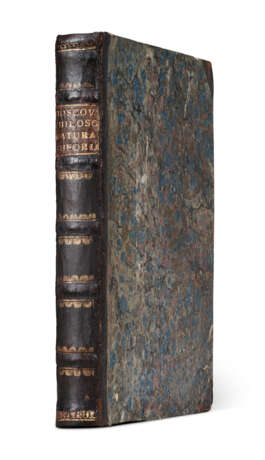ID 887784
Los 11 | Philosophiae naturalis theoria
Schätzwert
$ 40 000 – 60 000
“The birth of atomic physics” (PMM)
Very rare first edition of a fundamental work in the history of scientific thought, a precursor of modern atomic theory. The son of a cultured Dubrovnik merchant family, Boscovich (or Boskovic) became a Jesuit, and, like many intellectual Dalmatians of the period, emigrated to Italy. He spent most of his career there, as professor of mathematics at Rome and Pavia and as director of the observatory at Milan, teaching also in Paris and Vienna, and publishing widely in an astonishing variety of scientific disciplines. "Boskovic was perhaps the last great polymath to figure in an important way in the history of science … He stands between Newton and Leibniz at one extreme and Faraday and field theory at the other" (DSB).
The Theory of Natural Philosophy was Boscovich's masterpiece. In it he expounds a view of matter as a series of discontinuous indivisible points (puncta), interacting in pairs, with each point surrounded by a field of force alternately attractive and repulsive (or positive and negative) depending on the distance between them. Boscovich's "point-atoms" were "distinguished from geometrical points only by their possession of inertia and their mutual interaction. Extended matter then becomes the dynamic configuration of a finite number of centers of interaction" (DSB). This universal law of forces, which evolved from Boscovich's attempt to build a comprehensive physics based on but going beyond the ideas of Newton and Leibniz, anticipated many features of modern atomic and nuclear physics. Though inherently speculative, the importance of the universal law of forces was immediately recognized, especially in Britain. “[Boscovich's theory of matter] was widely studied, and Michael Faraday, Sir William Hamilton, James Clerk Maxwell, and Lord Kelvin (to mention only English scientists) stressed the theoretical advantage of the Boscovichian atom over rigid atoms. In any case, Boscovich's work marked an important stage in the history of our ideas about the universe, and his system will remain the paradigm of the theory of point particles" (Encyclopedia of Philosophy, ed. P. Edwards, New York 1972, I, pp. 350-351).
The work was reprinted in 1759, and a revised edition appeared in Venice in 1763. Copies of this first edition are notoriously rare. We trace only the Norman copy in the auction records of RBH and that copy is in a 19th-century binding. Norman 277; PMM 203; Riccardi 1:180, no. 53.1; Sommervogel I 1840 66; Whyte, pp. 41 and 127-152.
Quarto (217 x 167mm). Four folding engraved plates; gatherings c and d transposed. Contemporary calf-backed marbled boards, spine gilt-lettered (minor rubbing, light repair to joints and hinges).
| Herkunftsort: | Osteuropa, Italien |
|---|---|
| Kategorie des Auktionshauses: | Gedruckte Bücher |
| Herkunftsort: | Osteuropa, Italien |
|---|---|
| Kategorie des Auktionshauses: | Gedruckte Bücher |
| Adresse der Versteigerung |
CHRISTIE'S 8 King Street, St. James's SW1Y 6QT London Vereinigtes Königreich | |
|---|---|---|
| Vorschau |
| |
| Telefon | +44 (0)20 7839 9060 | |
| Aufgeld | see on Website | |
| Nutzungsbedingungen | Nutzungsbedingungen |





